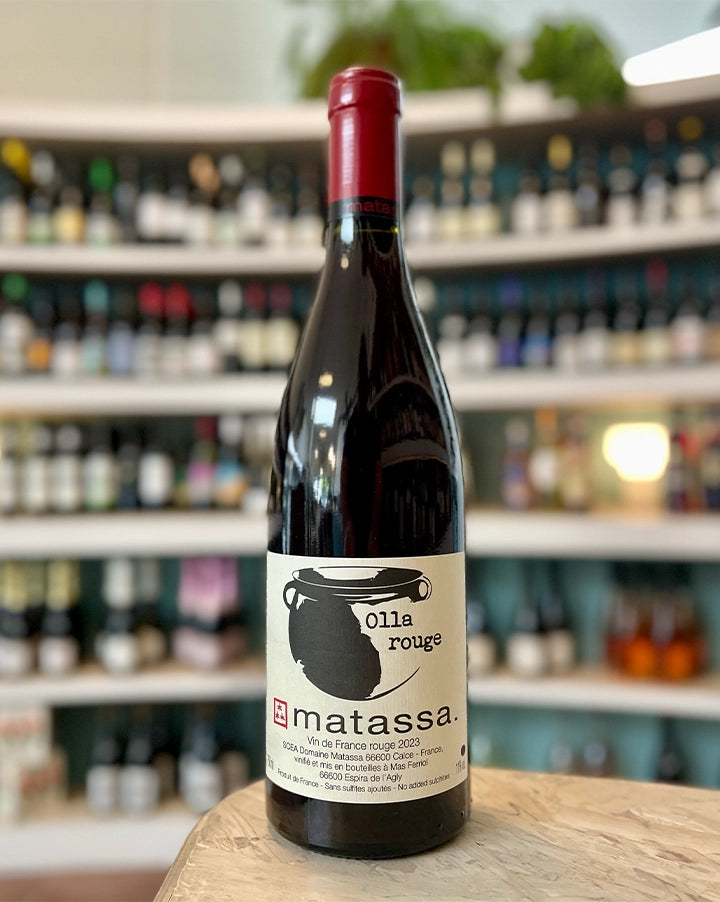Matassa 'Coume de l'Olla' 2023 Rouge Vin de France
Matassa 'Coume de l'Olla' 2023 Rouge Vin de France
750ml bottle
11% abv
Aromas of wild raspberry and red currant. Juicy, with fresh red berries and earth, and a long finish. Some white grapes in the mix provide an herbal lift. Lovely with a slight chill.
Coume de l'Olla comes from a single vineyard of the same name.
Certified organic Grenache Noir, Grenache Gris, & Macabeu from 56 year old vines rooted in clay & limestone soils. Grapes are co-fermented in concrete and see a three day maceration. Pressed and racked back into concrete for aging.
Unfined/Unfiltered
How does a South African who grew up in New Zealand end up starting an iconoclastic estate in the Roussillon? This isn't exactly an everyday occurrence, but so it goes for Tom Lubbe of Domaine Matassa. In the late 90's, Tom was working at the only estate in South Africa using indigenous yeasts and lower yields. Interested in working with Mediterranean varietals, Tom managed to score a three month internship at the legendary Domaine Gauby in the village of Calce. Gérard Gauby quickly befriended Tom and asked him to come back for three consecutive vintages as a cellar hand. During that time, Tom met his wife Nathalie, who just so happens to be Gérard's sister.
The birth of their first child made Tom reconsider moving back to South Africa, opting instead to stay in Calce to start his own estate. Matassa was founded in 2003, with the first vintage entirely produced in the recently married couple's living room. Gérard felt so bad about this that he gave Tom the old Gauby cellar in 2004! Tom works with many of the traditional Catalan varieties: Carignan, Mourvèdre, Grenache (mostly Lladonner Pelut, the ancient Catalan strain of Grenache), Grenache Gris, Muscat d'Alexandrie and Muscat Petits-Grains. These grapes are often co-planted together, particularly in the very old vines. In total, 20 hectares are cultivated on lime, clay, schist, marl, black slate and black marl soils.
While Tom still farms some of the very low yielding old vines around the village of Calce, he has vastly expanded to different areas where yields are more generous, typically in the 25/30 hl/ha range (still relatively low for the region). These include the lieu-dit Coume de l'Olla as well as a 2019 acquisition of eight hectares planted above his new farmhouse.
The vineyards are worked naturally without any chemical aids and Tom is certified organic by Ecocert. And while he does occasionally use biodynamic techniques to activate and nourish his soils, over the years this has become less of a priority. Instead, an adamant dedication to cover crops has completely transformed his soils and in turn the wines. Tom is convinced that the increased insect life within the soils, particularly worms, has changed the flavors of his wines. Another shocking effect: a drastic drop in alcohol. Tom has always harvested much earlier than most, usually starting with the Muscat in early August. In 2005, they would typically reach a potential of 13.5% alcohol. In 2018, they came in around 10.5%.
Much has also changed in the cellar over the years. All the wines have now intentionally been declassified to Vin de France. As mentioned above, the alcohol is much lower, rarely more than 12%. The white wines are all macerated on their skins, a choice that goes back to "Alexandria" 2008, the first Matassa wine of its kind. For the reds, whole-cluster infusions take precedent to maceration and extraction, with white grapes often co-fermented. If oak is used, it is not to bring structure to the wine but rather oxygen. Longer élevages have been abandoned to bottle wines much earlier. Everything is bottled without filtration or fining. Sulfur, which Tom had used judiciously in the past, has not been added to any of the production since the 2015 vintage.
Old vines on clay and limestone soil, rich in iron. Macerated in whole bunches for 2 weeks, followed by 8 months in vats, unfiltered. This wine is organic and biodynamic, made with native yeast and no added sulfur.
Share

